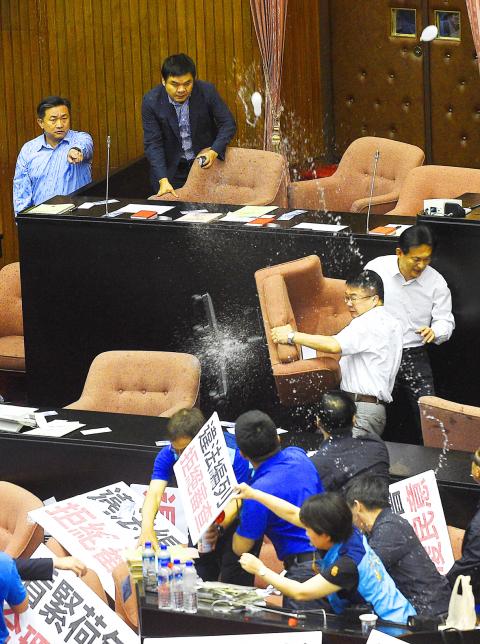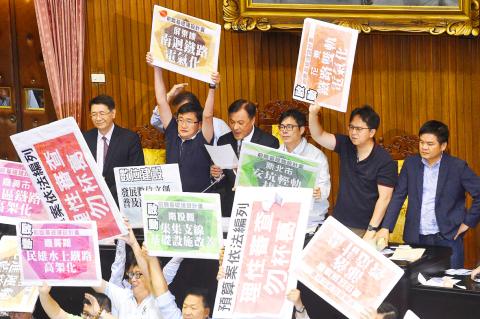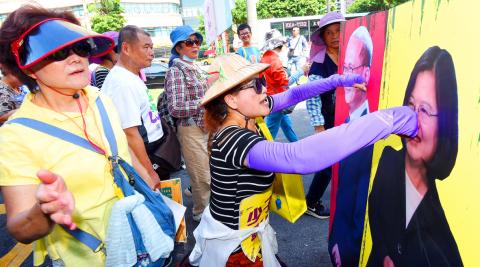After a presentation on the Forward-looking Infrastructure Development Program by Premier Lin Chuan (林全) was yesterday once again blocked by Chinese Nationalist Party (KMT) legislators, Legislative Speaker Su Jia-chyuan (蘇嘉全) bypassed a legislative question-and-answer session to send the Executive Yuan’s budget proposals to a committee review.
As soon as Su announced the start of the plenary session, KMT legislators, who had stayed in the chamber overnight, started shouting slogans, sounding air horns, blowing whistles, and throwing water balloons and fake banknotes to prevent Lin from reaching the podium.
KMT caucus secretary-general Lin Wei-chou (林為洲) threw a water balloon at DPP Legislator Wu Ping-jui (吳秉叡). Wu countered by tossing a chair toward Lin Wei-chou, which missed.

Photo: Chen Chih-chu, Taipei Times
DPP Legislator Chuang Ruei-hsiung (莊瑞雄) threw water from a vacuum flask at KMT lawmakers, who hit back with water balloons. Chuang then lifted up a chair and threatened to hurl it toward his KMT colleagues.
DPP caucus secretary-general Lee Chun-yi (李俊俋) scuffled with KMT Legislator Alex Fei (費鴻泰), while DPP Legislator Su Chen-ching (蘇震清) and KMT Legislator Hsu Chih-jung (徐志榮) also came to blows.
No more than five minutes into the session, the situation was completely out of control, forcing Su to end the meeting after advising Lin to leave.

Photo: Chen Chih-chu, Taipei Times
Su later sought to resolve the deadlock by calling a cross-caucus negotiation, which the KMT caucus refused to attend.
During the negotiation, People First Party caucus whip Lee Hung-chun (李鴻鈞) said that the Special Act on the Forward-looking Infrastructure Development Program (前瞻基礎建設特別條例), which was passed last week, stipulates that the budget cap for the first stage of the program is set at NT$420 billion (US$13.8 billion) over four years, but the budget proposal by the Executive Yuan was for only NT$108.9 billion over two years.
The Cabinet should at least outline its budget plans over four years before legislators can conduct a more detailed review of the funds needed for the early stages of the program’s 65 sub-projects, Lee said.

Photo: Liu Hsin-de, Taipei Times
New Power Party (NPP) caucus whip Hsu Yung-ming (徐永明) said the NPP hopes that Lin can brief legislators on the program before the budget proposal proceeds to committee review, so the proceedings would conform to due legislative procedure.
Whether the Cabinet has breached the act in its way of budgeting the program is “subject to different interpretations,” Hsu said, suggesting that there is ambiguity in the act.
He said that Lin’s presentation and the question-and-answer session should be postponed until Monday.
Su agreed, adding that he would consult with the KMT caucus for its opinion.
Speaking by telephone, Lin Wei-chou said that the KMT would not accept the terms proposed by Su during the negotiation.
In an unexpected move, Su re-emerged in the chamber shortly after the negotiations and announced that a motion by the DPP to send the budget proposal to committee review on Monday was to be voted on, despite KMT legislators’ strong protests.
The motion was passed after gaining the support of the DPP caucus, which has a legislative majority.
The KMT caucus in the afternoon held a news conference at the legislature, saying it would report Su to the Discipline Committee and file a lawsuit with an administrative court to determine the legitimacy of the motion.
Su’s bypassing of a question-and-answer session breached the Act Governing the Exercise of Legislative Power (立法院職權行使法) and deprived legislators of their right to question officials, Lin Wei-chou said, demanding that Su step down.
Budget proposals put forward by the former KMT administration had also proceeded to committee review without former premier Jiang Yi-huah (江宜樺) briefing the legislature, KMT Legislator Lai Shyh-bao (賴士葆) quoted Su as saying.

The Ministry of Foreign Affairs (MOFA) yesterday said it is closely monitoring developments in Venezuela, and would continue to cooperate with democratic allies and work together for regional and global security, stability, and prosperity. The remarks came after the US on Saturday launched a series of airstrikes in Venezuela and kidnapped Venezuelan President Nicolas Maduro, who was later flown to New York along with his wife. The pair face US charges related to drug trafficking and alleged cooperation with gangs designated as terrorist organizations. Maduro has denied the allegations. The ministry said that it is closely monitoring the political and economic situation

Conflict with Taiwan could leave China with “massive economic disruption, catastrophic military losses, significant social unrest, and devastating sanctions,” a US think tank said in a report released on Monday. The German Marshall Fund released a report titled If China Attacks Taiwan: The Consequences for China of “Minor Conflict” and “Major War” Scenarios. The report details the “massive” economic, military, social and international costs to China in the event of a minor conflict or major war with Taiwan, estimating that the Chinese People’s Liberation Army (PLA) could sustain losses of more than half of its active-duty ground forces, including 100,000 troops. Understanding Chinese

UNRELENTING: China attempted cyberattacks on Taiwan’s critical infrastructure 2.63 million times per day last year, up from 1.23 million in 2023, the NSB said China’s cyberarmy has long engaged in cyberattacks against Taiwan’s critical infrastructure, employing diverse and evolving tactics, the National Security Bureau (NSB) said yesterday, adding that cyberattacks on critical energy infrastructure last year increased 10-fold compared with the previous year. The NSB yesterday released a report titled Analysis on China’s Cyber Threats to Taiwan’s Critical Infrastructure in 2025, outlining the number of cyberattacks, major tactics and hacker groups. Taiwan’s national intelligence community identified a large number of cybersecurity incidents last year, the bureau said in a statement. China’s cyberarmy last year launched an average of 2.63 million intrusion attempts per day targeting Taiwan’s critical

‘SLICING METHOD’: In the event of a blockade, the China Coast Guard would intercept Taiwanese ships while its navy would seek to deter foreign intervention China’s military drills around Taiwan this week signaled potential strategies to cut the nation off from energy supplies and foreign military assistance, a US think tank report said. The Chinese People’s Liberation Army (PLA) conducted what it called “Justice Mission 2025” exercises from Monday to Tuesday in five maritime zones and airspace around Taiwan, calling them a warning to “Taiwanese independence” forces. In a report released on Wednesday, the Institute for the Study of War said the exercises effectively simulated blocking shipping routes to major port cities, including Kaohsiung, Keelung and Hualien. Taiwan would be highly vulnerable under such a blockade, because it